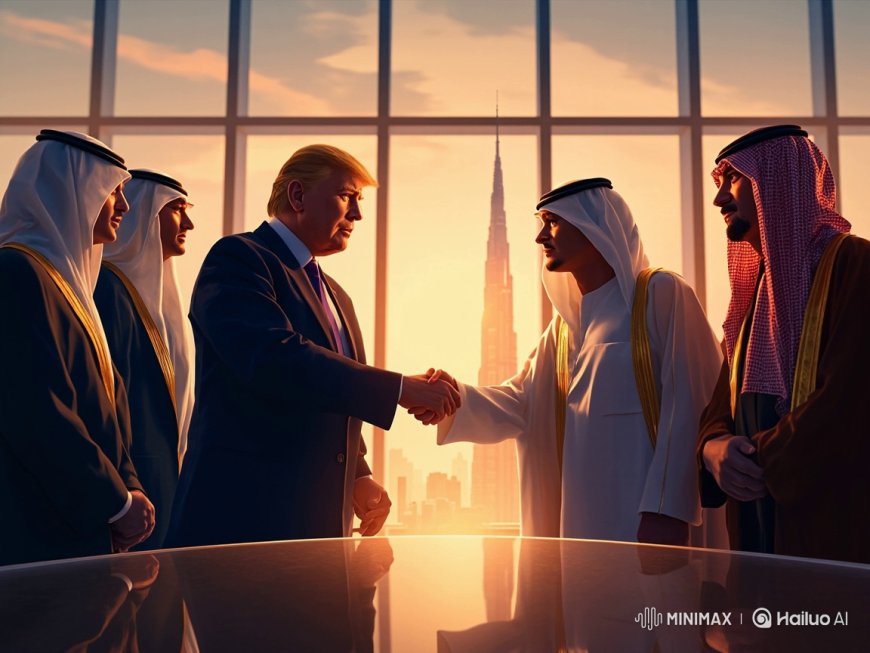What Donald Trump's Middle East Trip Reveals About US Foreign Policy
An in-depth analysis of Donald Trump's Middle East trip and its implications for US foreign policy, focusing on business deals, geopolitics, and shifting alliances in the Gulf region.

US President Donald Trump recently completed a significant visit to key Gulf countries, including Qatar and the United Arab Emirates (UAE), marking an important moment in the evolving dynamics of US foreign policy in the Middle East. The trip, which combined high-profile business engagements with strategic geopolitical discussions, reflects a broader trend of the United States’ approach to its role in this volatile yet crucial region.
Business Takes Center Stage Over Geopolitics
One of the most striking aspects of President Trump's Gulf tour was the emphasis on business. Trump himself highlighted the possibility of sealing up to $4 trillion in deals, signaling the importance of economic interests in shaping foreign relations. Unlike traditional visits driven primarily by diplomatic or security concerns, this trip underscored the United States’ renewed focus on leveraging economic partnerships with Gulf countries, which hold some of the world's largest financial reserves.
According to international affairs analysts, this business-driven agenda is more than mere transactional diplomacy. It reflects a calculated strategy to align US economic interests with the wealth and investment capacities of Gulf states. These countries are eager to channel their capital into American companies and projects, fostering mutually beneficial relationships beyond conventional security cooperation.
The Blurring Lines Between Personal and Institutional Relations
Another notable feature of Trump's visit is the apparent intertwining of personal relationships with official diplomatic ties. Observers have pointed out how the boundary between the United States as a nation and Trump's own personal and familial ties with Gulf ruling dynasties seems unusually blurred. This dynamic raises important questions about how foreign policy decisions are influenced by personal connections and informal channels of communication.
Such a fusion of personal and state interests could lead to both opportunities and challenges. On the one hand, personal rapport may facilitate quicker agreements and trust-building. On the other hand, it could complicate accountability and institutional consistency in US foreign policy, especially as administrations change.
Geopolitics as a Function of Business Interests
While business was the trip's dominant theme, geopolitics was far from absent. In fact, the two are deeply intertwined. Trump's approach appears to treat geopolitical tensions as variables to be managed in service of business objectives. This means prioritizing de-escalation and containment of conflicts to create a stable environment conducive to investment and economic cooperation.
This approach is particularly relevant to the ongoing tensions in the Gulf region, especially concerning Iran's nuclear ambitions. Historically a flashpoint for regional and global conflict, recent months have seen tentative moves towards negotiation. The Trump administration's outreach to Iran over its nuclear program marks a shift from prior hardline stances and reflects the influence of Gulf allies who have grown more receptive to diplomatic solutions than in the past.
Regional Shifts: Gulf States Aligning with New Strategies
Contrary to a decade ago, when Gulf states like Saudi Arabia, the UAE, Qatar, and Oman held divergent views on Iran, there is now a remarkable convergence of opinion favoring negotiations. This consensus aligns well with Trump’s pragmatic approach to foreign policy, where stabilizing regional relations serves both political and economic goals.
However, experts caution that the path to a durable agreement with Iran remains uncertain. While optimism is growing, fundamental differences persist, and geopolitical risks continue to loom large.
US Military Presence and Strategic Signaling
During his visit, President Trump also addressed US troops stationed at Qatar Air Base, a key military installation supporting operations in the Middle East. His reaffirmation of the willingness to use force to defend US interests and allies signals that, despite the focus on business and diplomacy, military strength remains a critical pillar of American strategy in the region.
Reengaging Syria and Redefining Alliances
Another significant development is Trump's decision to ease sanctions on Syria and consider reengagement, a move welcomed by Gulf Cooperation Council (GCC) countries. This shift diverges from the traditional US approach, which has typically required close coordination with Israel before altering policy towards Syria.
This apparent sidelining of Israel in the decision-making process represents a novel element in US Middle East policy, suggesting that Trump is willing to recalibrate alliances and strategies to suit evolving geopolitical and economic landscapes.
A Business-Driven, Pragmatic US Foreign Policy
Donald Trump's Middle East trip underscores a US foreign policy increasingly oriented around economic interests, pragmatic diplomacy, and personalized relationships with regional leaders. While geopolitics remain vital, they are often managed as part of a broader agenda that prioritizes stability and business opportunities.
This approach could reshape traditional US engagements in the Gulf, emphasizing trade, investment, and negotiation over confrontation. Yet, it also raises important questions about the long-term implications for regional security, institutional consistency, and the role of personal influence in shaping policy.
As the Gulf region continues to evolve, closely watching the outcomes of such high-profile visits will be essential to understanding the future trajectory of US foreign policy in the Middle East.
What's Your Reaction?
 Like
0
Like
0
 Dislike
0
Dislike
0
 Love
0
Love
0
 Funny
0
Funny
0
 Angry
0
Angry
0
 Sad
0
Sad
0
 Wow
0
Wow
0































